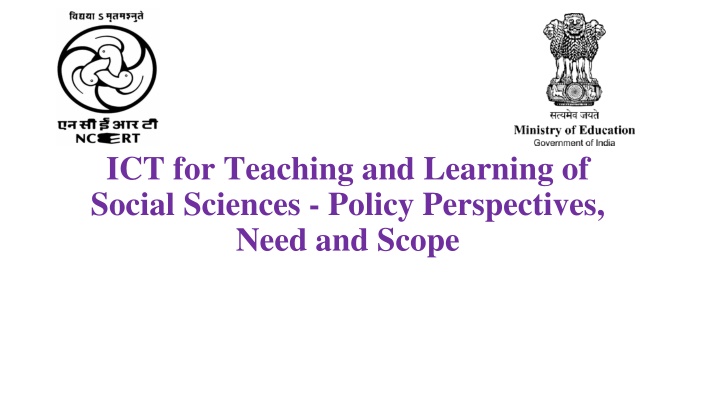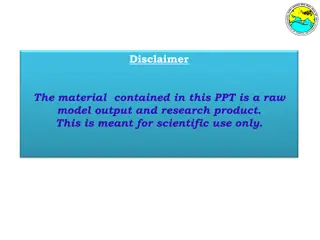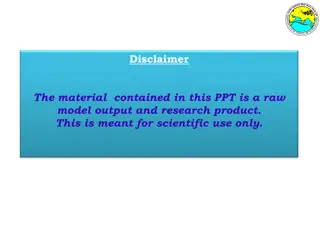
Empowering Education Through ICT: Policy Perspectives, Need, and Scope
Explore the importance of technology in education, particularly for social sciences. Discover the policy directions and initiatives in India for integrating ICT in teaching and learning. Gain insights into the accessibility and digital divide in education, focusing on equitable access and quality. Learn about the NAS 2021 data on students' access to digital devices across different states/UTs. Delve into PM eVidya's role in enabling multi-mode access to education, emphasizing teacher empowerment, cost-effectiveness, skill development, and inclusive education.
Download Presentation

Please find below an Image/Link to download the presentation.
The content on the website is provided AS IS for your information and personal use only. It may not be sold, licensed, or shared on other websites without obtaining consent from the author. If you encounter any issues during the download, it is possible that the publisher has removed the file from their server.
You are allowed to download the files provided on this website for personal or commercial use, subject to the condition that they are used lawfully. All files are the property of their respective owners.
The content on the website is provided AS IS for your information and personal use only. It may not be sold, licensed, or shared on other websites without obtaining consent from the author.
E N D
Presentation Transcript
ICT for Teaching and Learning of Social Sciences - Policy Perspectives, Need and Scope
Why Technology needed? Imparting equitable quality education and lifelong learning 1. 5M Schools 260M School going children 9.8M Teachers 1.4B Population (2/3 Youth) 15000+ TEIs
ICT Use in India: Policy Directions ICT Use in India: Policy Directions EDUSAT, Revised ICT @ School & ICT Award ICT @ School CAL NME -ICT CLASS Project ET Scheme INSAT NPE NPE-POA 1972 1983 1984 1986 1992 2004 2010 2020-24 2019 2018 2017 2015 2013 2012 ICT Policy NROER & ICT Curriculum NEP -2020, NETF PRAGYATA Guidelines, PM-eVidya & NDEAR, VSK, NCF-FS-2022, NCF- SE-2023, Draft NCF-TE- 2024 Digital India, ePathshala & ePG -Pathshala Samagra Shiksha, Cyber Safety & Security Guidelines SWAYAM MOOCs, SWAYAM Prabha-DTH Channels & DIKSHA NISHTHA, Guidelines for Development of eContent
The NAS 2021, data on Percentage of Students having access to Digital Devices State / UT wise % of students in class 3 having access to digital devices devices % of students in class 5 having access to digital % of students in class 8 having access to digital devices % of students in class 10 having access to digital devices Sl. No. State/UT 1 Jammu & Kashmir 67 69 61 79 2 Himachal Pradesh 87 90 71 90 3 Punjab 92 94 76 96 4 Chandigarh 91 95 77 96 5 Uttarakhand 77 79 69 82 6 Haryana 77 83 69 85 7 Delhi 88 91 73 94 8 Rajasthan 62 65 61 78 9 Uttar Pradesh 57 61 55 68 10 Bihar 52 55 53 68 11 Sikkim 80 84 70 93 52 Arunachal Pradesh 12 67 62 85 13 Nagaland 65 74 66 87 14 Manipur 62 69 64 81 15 Mizoram 74 79 69 88 16 Tripura 59 61 57 76 Meghalaya Assam 52 52 17 60 53 75 18 58 55 73 19 West Bengal 55 65 55 73 20 Jharkhand 57 59 56 71 21 Odisha 57 62 59 79 22 Chhattisgarh 61 64 60 78 23 Madhya Pradesh 60 66 60 79 24 Gujarat 69 75 65 82 25 Daman & Diu 82 86 71 89 26 Dadra & Nagar Haveli 77 75 72 81 27 Maharashtra 74 77 66 86 28 Andhra Pradesh 63 66 62 76 29 Karnataka 66 69 64 80 30 Goa 92 93 75 97 31 Lakshadweep 87 92 70 94 32 Kerala 94 95 76 97 33 Tamil Nadu 64 64 64 81 34 Puducherry 72 79 72 91 35 Andaman & Nicobar Island 77 83 66 89 36 Telangana 67 75 64 82 37 Ladakh 74 84 69 88
Accessibility DIGITAL Affordability DIVIDE Equity Accountability Quality Education
PM eVidya enable multi-mode access to education Unifies all efforts related to digital/online/on-air education Themes Surrounding Students and Teachers Access to quality Education Teacher Empowerment Cost Effective Education Skill Flexibility & Convenience Inclusive Education Development PM eVIDYA enabling multi-modal access to education at scale Online Courses Special econtent Virtual Labs DIKSHA Radio Television eContent for specially abled DIVYANG (CWSN) Real-time experience of experiments. Online Courses for school education Radio Broadcast/ Podcast/ Community Radio One Nation One Digital Platform One Class, One TV Channel 360K+ e-content in 126 Indian and 7 foreign languages for Grades 1 -12 400 radio stations Store house of large number of eBooks and e-Contents 4,247 Indian Sign Language programs 200 Live DTH TV Channels 285 virtual lab experiments Live sessions on iRadio and JioSaavn App
NEP 2020 Chapter No. 23 Technology Use and Integration Cutting Edge technologies NETF eContent for Divyang students ICT Integration of Platforms from School Education & Higher Education Technological interventions
NEP 2020 Technological Intervention Enhancing educational access Teaching-learning, evaluation Increasing access for divyang students Supporting teacher preparation & professional development Streamlining educational management and administration Removing language barriers
NEP 2020 Chapter No . 24 Online and Digital Education: Ensuring Equitable Use of Technology Pilot studies for online education PARAKH, NTA and State Boards Online assessment and examinations: Digital infrastructure Online teaching platform and tools Blended models of learning Content creation, digital repository, and dissemination Learning Games & Simulations, Augmented Reality and Virtual Reality Laying down standards Addressing the digital divide
DIKSHA One Nation, One Digital Platform Digital Content Variety -DIKSHA Features of DIKSHA Assessment Questions Energized Textbooks Infographics Courses Guidelines/Hand books Videos/ISL Videos Audios, Talking Books, Audio Books Interactive and Immersive Content Worksheets
Phygital ...which lead to ease of access to relevant digital content across the nation and enable continuity of learning Bridging of physical and digital worlds by energizing textbooks... QR relevant (student facing content) Code linking e-content and teacher to NCERT, Grade 9th textbook e-Textbooks Explanation Resources Practice Resources Learning Resources Teacher Focused Resources
Experiential Learning Lab Technological Advancements in Social Sciences: AR, Virtual Reality, VR Labs
Virtual Labs on DIKSHA National Education Policy (2020) and Union budget (2022-23) recommends creating virtual laboratories for equitable access to quality practical learning. DIKSHA Virtual Labs Experience: Theory and Procedure: Concept-related information for experiments. Animation and Video: Visualizing theoretical concepts. Simulation: Real-time experience of experiments. Viva Voce: Self-evaluation for concept understanding. Feedback: Continuous improvement based on user perspectives.
Continuous Professional Development (CPD) Platforms: MOODLE, SUNBIRD, OPEN edX, Google Course Builder Around 65 lakh+ Teachers, Teacher Educators & School Heads NISHTHA NISHTHA CPD Courses CPD Courses More than 30 courses available 4,30,998 enrolled including students, teachers, parents and civil service aspirants MOOCs for School MOOCs for School Education Education
ePathshala # Total Books as ePub: 2,344 # Total no of Flipbook: 2,757 https://https://epathshala.nic.in/
e-Jaadui Pitara launched on 10th Feb, 2024 leveraging state of the art AI capabilities Story Bot (Katha Sakhi) Parent Bot (Parent Tara) Teacher Bot (Teacher Tara)
e-Jaadui Pitara Multimodal Access to e-contents14 Languages Access via App for Smartphone users or IVRS (15108) for Non-Smartphone Users-Story of the Day, Song of the Day, Question of the Day in Multiple Languages AI Powered Bots -Story Bot (Katha Sakhi); Parent Bot (Parent Tara) & Teacher Bot (Teacher Tara) Compliments & Supplements the physical Jaadui Pitara
Indian Language Primers (104) 2 Primers (Kuwi & Desia) launched on 17 August 2023. 52 Primers launched on 9 Mar 2024 [4] Scheduled [48] Non- Scheduled 25 Primers released on 29 July 2024 and 25 Primers launched on 11 December 2024 Progress 21 Primers will be released during February, 2025 121 Target Languages Phase-IV Phase-III Phase-I Phase-II
Teaching-Learning & Assessment Social Science Teaching-Learning Assessment AR, VR and Virtual Labs Bhuvan Google Earth Kahoot Mentimeter Quizizz


